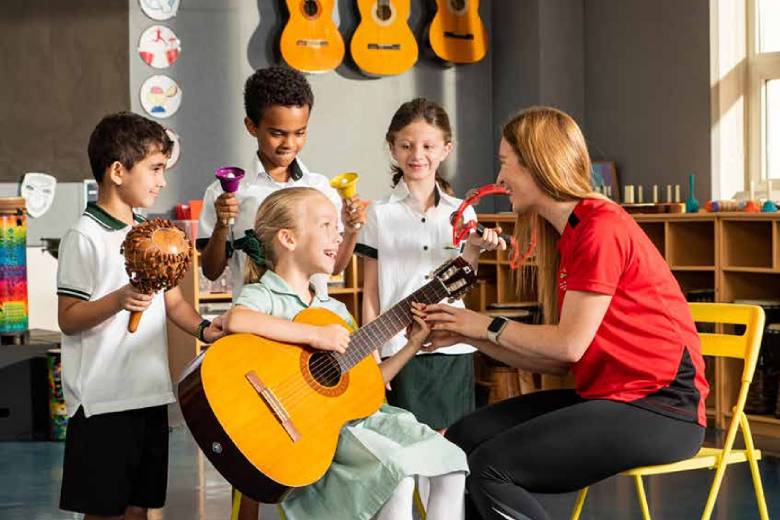There are few educationalists in the UAE with the experience and passion of Simon O’Connor, Director of Deira International School (DIS), with oversight over both the primary and secondary schools. Also working across the Al Futtaim Education Foundation, Simon joined DIS in August 2020, and prior to that, he had been principal of Jumeirah College, another outstanding school in Dubai, since 2013. Education UAE caught up with Simon, discovering, amongst other notable topics, what some of the school’s most notable achievements have been over the past year.
Simon O’Connor: Last year was enormously successful for the school, with a lot of the things that we had planned coming to fruition. So if you were to compare the beginning and the end of the year, when we do a review, it was really interesting.
The most significant thing without question was the Dubai Schools Inspection Bureau’s ‘Outstanding’ judgement. It was the first time we’d achieved that, and it confirmed the inspection we had the previous year by British Schools Overseas, but this was a much more challenging and rigorous inspection regime. There are only 20 schools in Dubai with an ‘Outstanding’ verdict. So for me, it’s about two things: it’s about bringing the school up to the standard required for that, but then getting it over the line in terms of recognition. So I think that was the banner headline for the year, but at the same time, that’s just a reflection of what’s going on at the school.
There were a lot of other things that took place; we had some really nice events. We hosted the BSME under-13 Games; we had 20+ schools from across the Middle East come to the school and compete. That in itself is a joyful experience, but when you contrast it with the previous two and a bit years where there were so many restrictions, to actually host that, to see students and parents from across the region there to celebrate the students’ success, was really special.
We’ve also seen a significant increase in the student population, and a lot of this is linked, inevitably, to the ‘Outstanding’ judgement, but I also think this is a manifestation of the running and performance of the school. We were absolutely delighted with both our IB and GCSE results in the summer. All of the exam boards were anticipating a dip in results – it was the first time since 2019 that those exams had been judged on non-Covid expectations – but we’ve managed to record exceptional results in both IB and GCSE. It was so pleasing to break those expectations.
There are only 20 schools in Dubai with an ‘Outstanding’ verdict. We were thrilled when the inspector said they were only giving us that rating because there wasn’t one above it!
And there have been developments in the school itself. We’ve introduced an IB hub, which is a three-storey facility for our post-16 students, which is absolutely cutting-edge. More importantly, I think, it was actually designed by the students themselves, so it really reflects what they want. And it’s one of the rare facilities I’ve ever seen that bridges the gap between sixth form and university – it’s much more styled in that way for them. We’ve got some new playgrounds and new learning resources for our students too, so last year was a really special year, and I think it’s solidified the work that’s been going on for the last two or three years.
EdUAE: Do you think a lot of the school’s success has to do with stability? You’ve been at DIS for some time now, but it seems in the UAE that school leaders and principals can be a bit like football managers.
SO: I can’t remember the statistics exactly, but I think the average tenure for a principal in Dubai is a little over two years, and yet there is fairly strong evidence that it takes three years to make an impact, so that in itself is a concern. You’re right, this is my fourth year, but the head of primary and the head of secondary joined at the same time as me, so we’ve got that stability. We’ve also got the stability and consistency of Al Futtaim as well; there’s a lot of movement in schools at the moment, being taken over and bought by others, which I’m sure brings benefits, but, yes, that stability is important because it’s about establishing a vision, and that takes time to manifest.
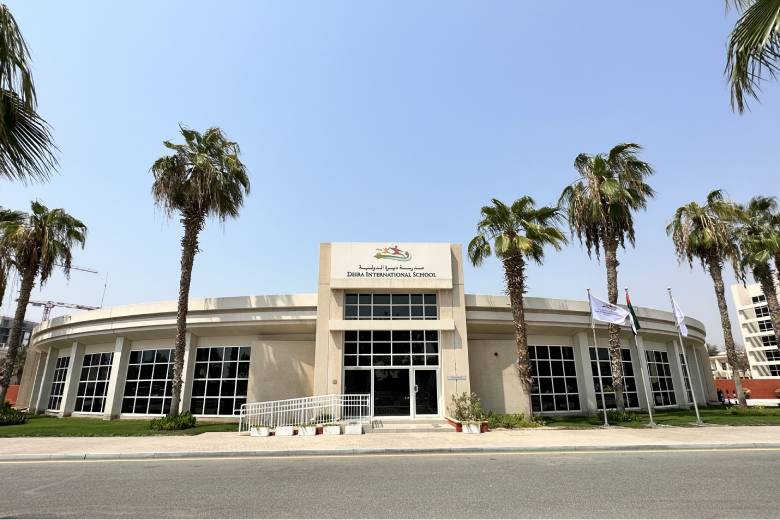
EdUAE: Can you share a story of how one of your students has gone ‘above and beyond’ in either an academic or more community-focused way in 2023?
SO: Yes, there have been lots of instances. We’ve got one student who got 100% in their maths GCSE in Year 10; it was an early entry, and that was a phenomenal achievement. We’ve got a particularly amazing international chess champion in Year 8 who has achieved so much and done extraordinarily well in competitions over the summer. We’ve got quite a few student-led initiatives too. There is, for instance, a massive building site next to the school at the moment with over a thousand workers on it, and we organised an iftar for the construction workers. That was such a lovely thing to do.
We also had a Year 11 student last year who helped to organise, along with a number of other students across Dubai, a response to the Pakistan flood – it was with an organisation called the Indus Hospital and Health Network, for which she was an ambassador. I will never underestimate the importance of student qualifications and outcomes, but we work hard to encourage the wider role of students, and part of that is community and giving back to society. And it’s not just giving back but understanding your place in the wider community, so it was wonderful to see that project itself.
EdUAE: That’s important nowadays, isn’t it? I remember in my day we used to take a tin of beans to school at Harvest Festival time, and that was it as far as the community was concerned. But now the kids are more keyed in, aren’t they? They have more understanding about what’s going on in the world.
SO: They do, and actually one of the things that we’ve done deliberately – and I would agree with you, I remember Harvest Festivals, and it’s quite interesting looking on social media that they are still going on in the UK – is completely change certain parts of the school in relation to ECAs, the learning beyond the classroom, and we’ve developed a whole programme around CAS.
CAS is an element of IB; it stands for ‘Creativity, Action and Service’, but now we have a much more deliberate approach to that, a much more explicit approach that runs right the way through the school. So students actually have their ‘CASports’, as they are called, where they record this, and in Key Stage 3 and below, we’re replacing a lot of the homework expectations because I think a lot of homework is done for the wrong reasons. Too much homework is ‘finish this exercise’ and is designed because people think the inspectors want it or maybe parents want it. So we’re doing a much more personalised approach to homework to address gaps that specific students have, but what’s left is time for students to be (a) children and enjoy themselves, spending time with family and friends, and (b), and more deliberately, to work on their contribution to community and society.
It’s all very well saying we want you to have a role in the community, but if every night you’ve got four hours of homework, we’re the problem, not the solution. So this CAS focus is really, really important, and I think it will help to maintain those improvements we achieved last year.
We have specific school leaders who work with students throughout the school to develop leadership
EdUAE: That community involvement promotes leadership skills by default doesn’t it?
SO: Leadership is one of those things that people expect youngsters to develop, but no one spends time helping them to do that. We do that quite deliberately. We have a leadership team with head boys, head girls, and deputies, and there are specific projects run by the students. A good example would be the design of the IB hub, plus our response to sustainability and charity, and we actually have a student working specifically on equality and diversity to ensure we reflect the community right the way across. So we have specific school leaders who work with students throughout the school to develop leadership, and we also bring in external people to try and help them develop leadership skills to support the work we are doing ourselves. Students get to understand the qualities of leadership.
This is not some kind of 1980s dictatorial leadership; it’s about servant leadership, understanding your role in leadership, the skills of listening, and the skills of empathy. We also, and I think this is connected, very consciously made the decision to enhance our coaching skills across the school. We work with an external provider, an education coach, who comes in not to coach us but to help us develop our coaching skills. Staff and students are developed to be coaches, encouraging the most effective form of leadership. One of the things that weighs heavily on me is the kind of students we are producing. The world faces many challenges moving forward, and we need to ensure those problems are solved in the right way with the right leadership. So we need to ensure that we are sending students out into the future equipped to confront the issues.
EdUAE: I think the other thing that’s evolving, particularly recently, is that it’s now okay for a student to want to be a musician or an artist and not just a lawyer or doctor.
SO: I think in a lot of communities, there has been a huge over-emphasis on the core subjects. I’m not saying that English, maths, and science aren’t important. But I think there are many lessons we can take from the pandemic and lockdown, including the importance of the arts and the skills that the arts bring to people. As someone who is passionate about music and has enjoyed being involved in choral singing himself, I can’t over-emphasise that. So yes, we are very keen to promote the arts. Recently, for instance, we’ve expanded the teaching numbers we have in these subjects to be able to deliver and expand the curriculum.
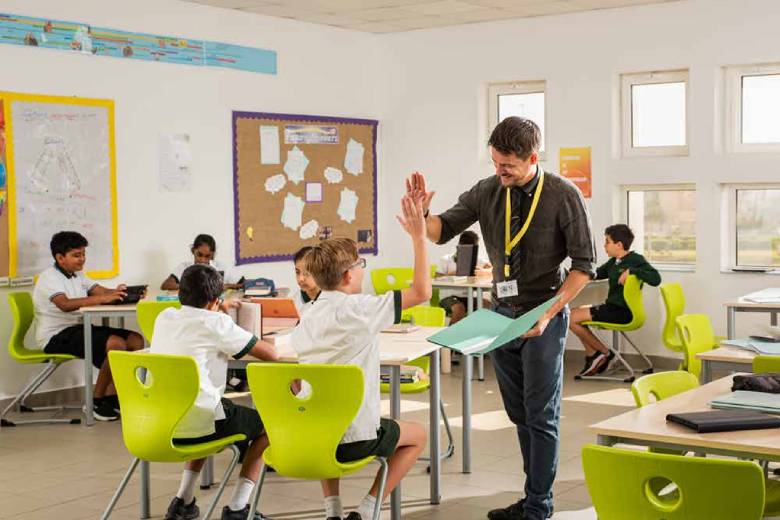
It was wonderful last year. It was the first time in three years we were able to have proper drama and music productions again, and we intend to continue that this year. And we’re creating opportunities, so we had students who went to work on an expo, and we actually send most musical students out into the community so that they have a role there. Particularly enjoyable was a collaboration last year with an organisation called Arts International, which sends West End stars over to work with our students.
I think the temptation in these cases is to work with IB and the upper years, but they looked principally at physical theatre with our younger students. We had some people come over to see how we were preparing for certain productions, so they actually got external input that went beyond our teaching staff. Also, and I think this is at the core of an international school, there was a production that was largely performed in Arabic. We had an award-winning native Arabic-speaking actor from the West End too, who worked with students whose first language is Arabic as well as non Arabic students. So we cover genuine culture, not just Disney.
We’ll be bringing in a whole range of further artists this year while making sure it reflects the diversity of the community we have here, so not just artists from the UK and USA, but local artists too. We’ve got some new music and drama staff this year too, who are really excited about working on the Arabic elements to highlight the diverse opportunities. The world does not need more lawyers, but it certainly needs more artists and more inspiration. It’s not just about career pathways; it’s about developing creativity in all areas – it’s about public speaking, it’s about confidence, it’s about listening, and it’s about teamwork.
We’ve got one student who got 100% in their maths GCSE in Year 10
EdUAE: You mentioned the problems that the world faces at the moment, but being inclusive is the answer to most of those problems, isn’t it? Once we understand each other, problems tend to go away.
SO: Yes, and I think there are whole variety of things we can do. We are by definition a very inclusive school in the sense of all of the nationalities in the school, so it would be difficult to be exclusive in that context, but obviously, we don’t want to be; we want to be as inclusive as we can. One of the nice ways in which we do that is by making opportunities each year to understand each other’s cultures – it’s not about promoting one culture over another. Days such as our International Day, where it’s so enjoyable to get parents back on-site and have 70 or 80 nationalities represented, it’s really an insight into diversity; it’s one thing to get a list, but to actually go and talk to someone about their culture and hear a little bit of the history is great.
I think we are a very inclusive school in terms of students of determination too; we exceed expectations in that area, and that’s something we’re really proud of. What do we do to facilitate that? Well, again, we’ve just had an expansion of our inclusion team so that we have that support, but it’s also about ensuring that we’ve got the right academic pathways for the students, so we do offer a very diverse range of subjects and qualifications.
One of the big changes this year is that we’ve got a lot more ELL students. Dubai is a very fast-moving city and has a lot of people moving in and out, and we’ve noticed a large influx of Russian and Chinese students, many of whom can’t speak English at all. Now, there are two options there: we can say we’re an English-medium school and you can’t come here, or the alternative route is to welcome people, so we’ve built up our ELL team and work to ensure we can support those students. We’ve taken our staff through a 10-week programme, so they are equipped to support them too. And we’ve also made links with the British Council so that they get extra support outside of school. The consequence is an increasingly diverse community.
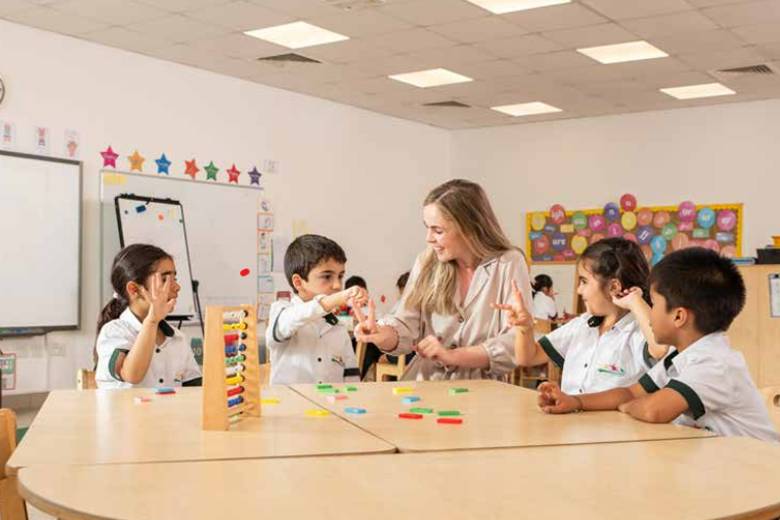
EdUAE: My next question was about the emotional well-being of students, but what you’ve just said is all part of that isn’t it? It’s not just counsellors and therapists?
SO: The DISB inspection regime is now judging schools on their response to well-being, and we were delighted to not only get the highest possible rating for well-being, but were also thrilled when the inspector said they were only giving us that rating because there wasn’t one above it! I do think we take a systemic approach to this, but I also I think we need to be able to measure and to continually ask questions. We’ve introduced a couple of pieces of technology over the last 18 months that continually ask those questions, the first of which is “Are you okay? Is there anything you need help with?” It’s all online; it’s on their phones, and if a student says they do need some help, they get an instant response. But we’ve got a whole series of domains of well-being asking that question, and it could be based on an individual, a year group, or the whole school. So we’re constantly asking how can we do better.
EdUAE: What are the biggest challenges in education at the moment and how are you tackling those?
SO: I think there are many. We are members of COBIS (the Council of British International Schools), and I am somewhat haunted by a comment a student made on a student panel: “Education and adults are constantly telling us that my generation has to solve the problems of the future, but you’re not equipping us to do that.” And that’s going to stay with me for quite a long time because I think it is really important that we focus on that.
Suitability and curriculum is one facet – it actually hasn’t changed, and I’m not talking about Deira or even British education; I’m talking about the curricula that schools deliver, which probably hasn’t changed that significantly over the last 50 years, but actually, the context in which people are learning has changed dramatically. Certainly, the issues facing the world have. So we have a big focus on sustainability education this year. Also, we’re looking at how suitable the education is. For example, in my subject, history, are we just teaching the history of ‘pale male stale’, old men through history, or are we ensuring that our curricula are diverse, which, for instance, recognises the contribution that women have made to history? So curricular is one. There are challenges ahead, but I also see them as opportunities. We spoke at the beginning about our achievements over the last 12 months, and we have a good idea of where we want to go over the next 12 months. That’s exciting. In his role as
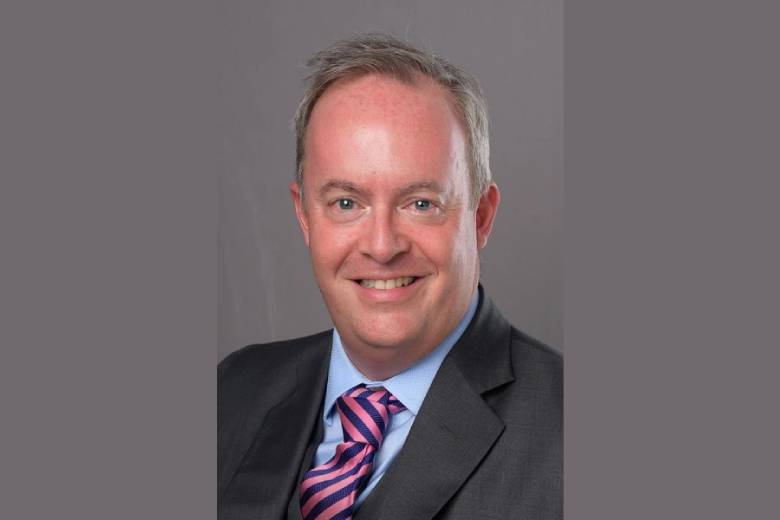
Director of Deira International School, Simon O’Connor has insight over both the primary and secondary schools. With over 25 years of experience in education, Simon joined DIS in August 2020. He was previously Principal of Jumeriah College for seven years, making him one of the longest serving principals in British Premium Schools in Dubai. Holding a BA in History and Philosophy, a PGCE, a Master’s Degree in Education Leadership and a National Professional Qualification for Headship, Simon is passionate about learning and ensuring all students are challenged in lessons in order for them to achieve their full potential.
















